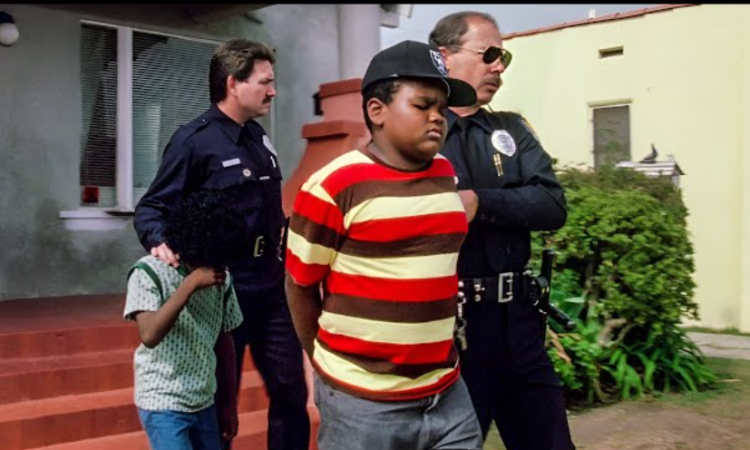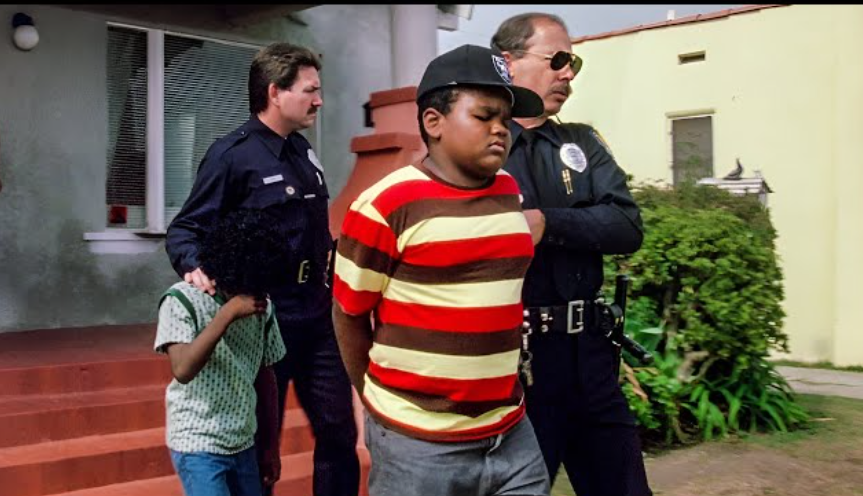
“Two boys help an old man carrying food. The next day, the police knock on their door. In the heart of Detroit, amidst the crumbling facades and the stark contrasts of life’s fortunes, Chony and Malik, black, navigate their youth. The city’s gritty backdrop mirrors their own struggles, a daily testament to their resilience.

Born into a threadbare existence where the echoes of their father’s departure linger and their mother’s mental battles cast long shadows, the brothers embody the essence of hope amidst despair. Chony, at 16, carries the weight of the world with a quiet determination, his shoulders squared against the challenges. Malik, just a year younger, matches his brother’s courage step for step, his eyes alight with dreams of a future untainted by their present adversities.
Their bond, forged in the fires of their shared trials, is their refuge. The love for their mother, Barbara, a beacon in their darkest nights, and their unwavering support for one another are the threads that knit their world together. Hunger, an all too familiar foe, gnaws at them, a relentless reminder of their circumstances. Yet, it is this very hunger that propels them forward toward a decision that would alter the course of their lives.
With hope as their guide, they step beyond the boundaries of their existence, venturing into an affluent part of town, a world away from their own. Their aim is simple: to exchange labor for food. This quest leads them to a chance meeting with Matt, a man whose arms are laden with groceries, a symbol of abundance that is foreign to the boys.
Their request is met with surprise, but it is their honesty and palpable need that touches Matt, prompting an act of kindness that spirals into something much greater. Matt’s decision to help goes beyond mere charity; it becomes a conduit for connection as he invites the boys to fill a cart with necessities. He opens a window into their lives, glimpsing the depths of their struggles and the strength of their spirits.
This encounter, rooted in compassion, grows into a lifeline not just for Chony and Malik, but for Matt as well, knitting their lives together in unforeseen ways. However, the ripple of their meeting spreads further, catching the attention of the local authorities. Misinterpretations lead to a police visit, a stark reminder of how quickly misunderstandings can escalate, challenging the fragile bonds of trust and community.
Yet, it is this very challenge that amplifies the power of empathy, transforming a simple act of kindness into a testament to the strength of human connection, the resilience of family, and the indomitable spirit of hope. As dawn broke over Detroit, casting a soft glow on the streets that Chony and Malik once roamed in search of sustenance, the city awoke to a story that tugged at the heartstrings.
Matt, moved by the encounter with the two brothers, took to social media to share their tale of resilience and his moment of unexpected connection. His words, meant to inspire and foster empathy, quickly rippled through the community, reaching far beyond the screens they were shared on. However, not all eyes that perused the tale saw it through the lens of compassion.
Suspicion, like a shadow, crept into the heart of a neighbor who, upon recognizing the setting and its characters, saw not a story of kindness, but a narrative marked by mistrust. Misunderstanding the nature of the boys’ presence in their affluent part of town, they dialed the authorities, painting Chony and Malik not as figures of sympathy, but of suspicion.
The sound of police knocking shattered the fragile peace of the Black family’s mourning. Officers, stern and authoritative, stood at their threshold seeking the two boys whose tale of hardship had just begun to find echoes of support. Their questions, probing and laced with underlying doubts, sought to peel away the truth of the boys’ intentions.
The community, once a silent backdrop to the struggles of families like the Blacks, found itself at a crossroads. Matt’s heartfelt narrative had ignited a spark, dividing the neighborhood. Some, touched by the raw honesty and vulnerability of the boys’ plight, stood in solidarity, ready to defend them. They saw in Chony and Malik the face of every struggle unnoticed and every cry for help unheard.
Yet others, swayed by fear and suspicion, hesitated, their support muddied by the cloud of prejudice. This moment became more than just a misunderstanding; it symbolized the broader challenges faced by those on society’s fringes. It was a stark reminder of how quickly empathy can be overshadowed by fear, how the stories of the marginalized are often met with skepticism, and how the journey towards understanding and support is fraught with the hurdles of prejudice and judgment.
Yet amidst this turmoil, the story of Chony and Malik, shared by Matt, stood as a beacon, challenging each individual to look beyond their biases and embrace the power of empathy. The unsettling visit from the police, rather than closing doors for Chony and Malik, inadvertently opened the floodgates of communal discourse.
What began as a distressing misunderstanding quickly evolved into a watershed moment for the broader community, stirring a collective awakening to the values of empathy, support, and mutual understanding. Matt’s act of sharing the boys’ plight on social media, intended as a beacon of awareness, became a rallying cry that reverberated far beyond the confines of their neighborhood.
As the truth of the Black family’s hardships unfurled in the public eye, the narrative took on a life of its own. Matt’s post, once a simple recount of an encounter born from kindness, morphed into a viral sensation, touching the hearts of strangers near and far. It wasn’t just a story being shared; it was a call to action, a reminder of the profound impact of collective empathy.
The GoFundMe campaign that Matt had initiated as a modest attempt to alleviate the family’s immediate struggles swiftly ballooned, fueled by the generosity of those moved by the boys’ resilience and aspirations. The influx of support was transformative, not just in the tangible sense of funds raised, but in the intangible ripples it created within the community and beyond.
It demonstrated vividly how empathy, when mobilized, can transcend barriers, dismantle prejudices, and foster a shared sense of humanity. The funds became a foundation upon which the Black family could rebuild, a lifeline to education, stability, and the nurturing of Chony and Malik’s dreams of entrepreneurship.
This unfolding of events stood as a testament to the potency of kindness in its most unadulterated form. In the depths of their darkest dreams, when the path forward seemed obscured by shadows of doubt and hardship, the Black family found themselves at the heart of a community rekindled by hope.
The support that cascaded in from all corners did more than just provide it; it illuminated the path toward a future the boys had only dared to dream of. It underscored a powerful truth: that within the collective heart of humanity lies an inexhaustible wellspring of kindness, capable of guiding us towards healing, understanding, and the realization of dreams that once seemed unattainable.”




